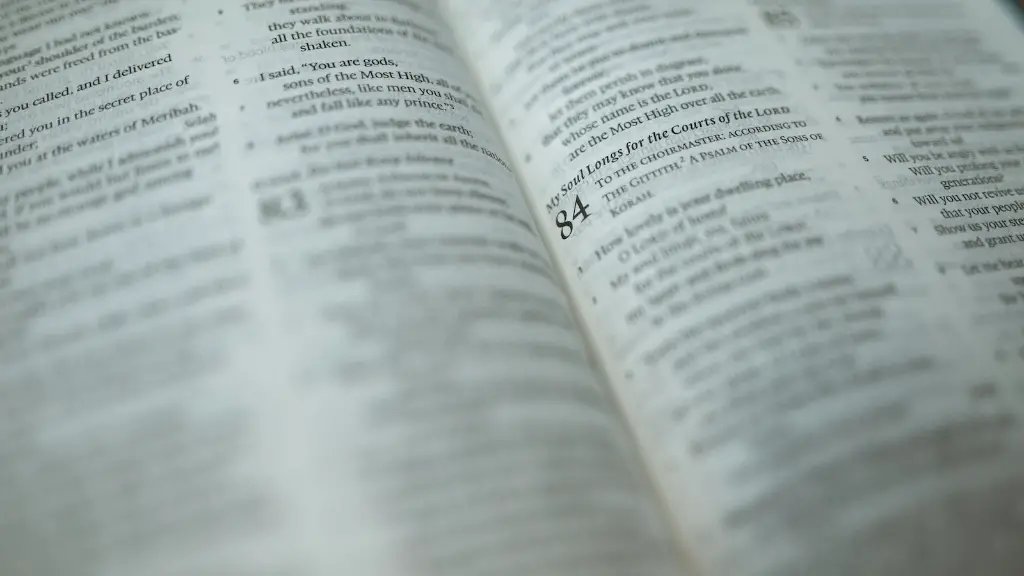The Bible does not give us a direct command about debt and borrowing. However, there are principles in Scripture that can guide us as we make decisions about whether or not to take on debt. In general, the Bible tells us to be good stewards of our resources and to be wise in our financial choices.
There are a few specific verses that mention debt and borrowing. In Proverbs 22:7, we are told that “the rich rule over the poor, and the borrower is servant to the lender.” This verse teaches us that when we borrow money, we become subject to the person we owe. We are no longer in control of our own finances.
Another verse that mentions debt is Romans 13:8. This verse says, “Owe no one anything, except to love each other, for the one who loves another has fulfilled the law.” This verse instructs us not to be in debt, but to love one another. When we love others, we fulfill the law.
The Bible also gives us principles that can help us make wise decisions about whether or not to take on debt. For example, in Matthew 6:24, Jesus tells us not to worry about money, but to trust in God
The Bible has a lot to say about debt and borrowing! In Matthew 6:24, Jesus says, “No one can serve two masters. Either you will hate the one and love the other, or you will be devoted to the one and despise the other. You cannot serve both God and money.” This is a clear indication that we should not let money control us, but instead should serve God with our whole hearts.
In Romans 13:8, Paul says, “Let no debt remain outstanding, except the continuing debt to love one another, for whoever loves others has fulfilled the law.” Paul is telling us here that we should do our best to pay off our debts, so that we can focus on what’s really important – loving others.
There are many other verses in the Bible that talk about debt and borrowing – too many to list here! – but these are just a few that give us some guidance on how we should handle our finances. Bottom line? We should be careful not to let debt get in the way of our relationship with God, and we should always be looking for ways to pay off our debts so that we can focus on what’s truly important.
What does the Bible say about debt and loans?
The Apostle Paul’s statement in Romans 13:8 is clear – we should only borrow money if we have a plan to repay it. This is true regardless of what the loan is for, whether it’s for college or something else. We should always be mindful of the debt we’re taking on, and make sure that we can realistically repay it.
God’s Word is clear that anyone who borrows money should repay it. This is the absolute minimum requirement to avoid being considered wicked. If we are gracious and give, as the righteous do, we will be blessed by God.
What Scripture says against borrowing
The Bible is clear that if we are obedient to God, He will bless us financially. We will be able to lend to others and not have to borrow. However, if we are disobedient, God will withhold His blessings and we will have to borrow from others. Therefore, it is always best to be obedient to God and His commands.
The Bible does not forbid debt, but it does not speak positively of it. It acknowledges that debt is a part of life, but has several warnings that we need to pay attention to. Though debt was a part of the culture in Biblical times, it was very different than today.
There are a few things we can learn from the Bible about debt. First, we need to be careful not to let debt get out of control. Second, we need to be mindful of the interest rates we’re paying on our debt. And finally, we should always try to repay our debt as quickly as possible.
Does God want us to be in debt?
The Bible makes it clear that people are generally expected to pay their debts Leviticus 25:39. This is a clear and concise statement that should not be disputed.
Even if you’re in debt or walking through a rough financial season, tithing should still be a priority. Yep—you read that right. While it’s tempting to throw that money at your debt, the discipline and faith that tithing brings are so worth it.
What are the consequences of borrowing money?
The natural consequences of borrowing money can be difficult to manage. If you are unable to make your payments on time, you may be charged late fees. Additionally, if you default on your loan, your credit score could be negatively affected, making it difficult to borrow money in the future. If you find yourself in a position where you cannot make your payments, it is important to contact your lender immediately to discuss your options.
Proverbs 22:26-27 is a warning against becoming a guarantor for someone else’s debt. If you can’t pay the debt yourself, you could end up losing your own possessions. It’s better to be cautious and not sign any pledges that you may not be able to uphold.
How do you break the spirit of debt
In our consumer society, debt is seen as normal and something that we are expected to have in our lives. However, God wants to break the spirit of debt and the bondage that it can have on our lives. According to Scripture, savings is a “storehouse principle” that can help us break free from debt and release God’s blessing in our lives.
Borrowing power is the amount of money that a person, company, or government can borrow at a particular time. This is based on their financial situation. Having additional borrowing power should enable the company to continue operating.
Is debt a curse?
The Bible says that debt is a curse (Deut 28:44-45) and the borrower is servant (slave) to the lender (Prov 22:7). But Jesus came to set the captives free (Gal 5:1) and to release people from the curse into blessing (Gal 3:13-14)! How can we set people free from debt today?
We can set people free from debt by following Jesus’ example and teaching. Jesus taught us to love our neighbor and to forgive one another. He also taught us to be good stewards of our resources. When we apply these principles to our finances, we can help others to get out of debt and avoid it ourselves.
The LORD your God will bless you as He has promised you, and you will be able to lend to many nations. You will not have to borrow from any of them, and you will rule over many nations. They will not be able to rule over you.
Does God say we need money
It’s so important to keep our focus on God and not on money. Money is uncertain and it can disappear quickly, but God is always there for us. He richly provides us with all things we need and enjoy. So let’s not be arrogant about our money or let it become our hope, but instead let God be our hope and focus.
Don’t worry about anything; instead, pray about everything. Tell God what you need, and thank him for all he has done (Philippians 4:6).
God will take care of you! He is more than able to provide for all your needs, both spiritual and physical. So seek first his Kingdom, and live righteously, and all these things will be given to you as well.
How do you pray to get out of debt?
Father, I commit this hard work to You and trust You will help me come out debt free. In Jesus’ name, I’m asking for Your strategies. I trust Your generosity and know You want to lead me to wisdom. So give me Your wisdom to do the right things and make the right moves to get out of debt quickly. Amen.
There are a few different ways that people choose to tithe – some people give 10% of their total income before taxes or deductions, while others add up their bills and tithe 10% of that amount monthly. There is no wrong way to tithe, as long as you are giving back to God with your financial resources.
Does your tithe have to go to a church
Giving is an important part of the Christian faith, and many churchgoers say that the Bible commands them to give tithes. However, not all of them always put their tithes in the offering plate. Instead, some say that their tithes can go to a Christian ministry, or even to help an individual in need.
If you lend money to friends or family, it can damage your relationship with them, especially if they have trouble paying it back. The emotional damage can often feel worse than losing the money.
Conclusion
There is no one answer to this question as the Bible contains many different passages on debt and borrowing. Some verses advocate for being mindful of borrowing and lending money, while others praise the act of giving generously to those in need. Ultimately, it is up to the individual to interpret what the Bible says on this topic and how it applies to their own life.
The Bible has a lot to say about money, specifically debt and borrowing. In general, the Bible discourages borrowing and encourages saving. However, there are some specific passages that talk about when it is okay to borrow money. Overall, the Bible teaches that it is better to be financially responsible and avoid debt if possible.





